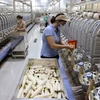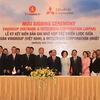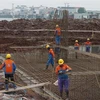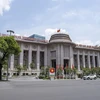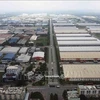Many individuals have used their own money to buy homes, thus helping prevent the local realty market from going bust, the Saigon Times Daily reported.
The point was shared by former Deputy Minister of Natural Resources and Environment Dang Hung Vo at an international seminar on property management and the role of financial institutions, co-organised by the Bank for Investment and Development of Vietnam (BIDV) and Japan’s Sumi Trust Bank in Hanoi on August 6.
“Realty inventories are high and many investors are worried about this but they have not gone bankrupt. This is credited to individuals who have used their own money to purchase the apartments of which they will take delivery in the future,” the Daily quoted Vo as saying.
Vo cited sources of administering agencies as saying that the value of realty inventories is some 100 trillion VND, excluding the money individuals have deposited for the apartments which will go up at housing development projects.
Vo said the individual deposits are huge but there are no official statistics about this. He noted that many property firms have complained about the stagnant property market but up to 80 percent of listed realty companies have made profits.
Can Van Luc, director of a training institute under BIDV, disagreed with Vo’s view, saying that bank loans account for 70 percent of the capital for the property market while the rest comes from households and individuals; equity, shares and bonds issued by companies and realty funds.
Luc estimated bank loans for the property market at nearly 262 trillion VND (some 12.5 billion USD), making up 8 percent of the total outstanding loans as of the end of last year.
Phan Duc Tu, General Director of BIDV, said bad debt of the property market peaked at 240 trillion VND (11.5 billion USD) in May last year. However, it is now under control and makes up a mere 4 percent of total outstanding loans.
Vu Van Phan, Deputy Head of the Housing and Real Estate Market Management Department under the Ministry of Construction, said the property market has shown signs of recovery since the middle of last year.
There were more than 4,000 successful property transactions in Hanoi in the first half of this year, doubling the number in the same period last year.
Realty inventories have dropped to 83 trillion VND worth as of end-June, a 35.4 percent decline versus the first quarter of last year.
Phan said there will be more positive factors for the property market, citing the draft amendments and supplements to the laws on housing and realty trading, and lax conditions for beneficiaries of the VND30-trillion low-cost home loan programme and for foreigners to buy homes in Vietnam.
Vo said housing prices in Vietnam are 15-fold higher than the average annual income of Vietnamese workers compared to the 25 times higher than the average annual income of labourers as recently announced by the Ministry of Construction.-VNA
The point was shared by former Deputy Minister of Natural Resources and Environment Dang Hung Vo at an international seminar on property management and the role of financial institutions, co-organised by the Bank for Investment and Development of Vietnam (BIDV) and Japan’s Sumi Trust Bank in Hanoi on August 6.
“Realty inventories are high and many investors are worried about this but they have not gone bankrupt. This is credited to individuals who have used their own money to purchase the apartments of which they will take delivery in the future,” the Daily quoted Vo as saying.
Vo cited sources of administering agencies as saying that the value of realty inventories is some 100 trillion VND, excluding the money individuals have deposited for the apartments which will go up at housing development projects.
Vo said the individual deposits are huge but there are no official statistics about this. He noted that many property firms have complained about the stagnant property market but up to 80 percent of listed realty companies have made profits.
Can Van Luc, director of a training institute under BIDV, disagreed with Vo’s view, saying that bank loans account for 70 percent of the capital for the property market while the rest comes from households and individuals; equity, shares and bonds issued by companies and realty funds.
Luc estimated bank loans for the property market at nearly 262 trillion VND (some 12.5 billion USD), making up 8 percent of the total outstanding loans as of the end of last year.
Phan Duc Tu, General Director of BIDV, said bad debt of the property market peaked at 240 trillion VND (11.5 billion USD) in May last year. However, it is now under control and makes up a mere 4 percent of total outstanding loans.
Vu Van Phan, Deputy Head of the Housing and Real Estate Market Management Department under the Ministry of Construction, said the property market has shown signs of recovery since the middle of last year.
There were more than 4,000 successful property transactions in Hanoi in the first half of this year, doubling the number in the same period last year.
Realty inventories have dropped to 83 trillion VND worth as of end-June, a 35.4 percent decline versus the first quarter of last year.
Phan said there will be more positive factors for the property market, citing the draft amendments and supplements to the laws on housing and realty trading, and lax conditions for beneficiaries of the VND30-trillion low-cost home loan programme and for foreigners to buy homes in Vietnam.
Vo said housing prices in Vietnam are 15-fold higher than the average annual income of Vietnamese workers compared to the 25 times higher than the average annual income of labourers as recently announced by the Ministry of Construction.-VNA

